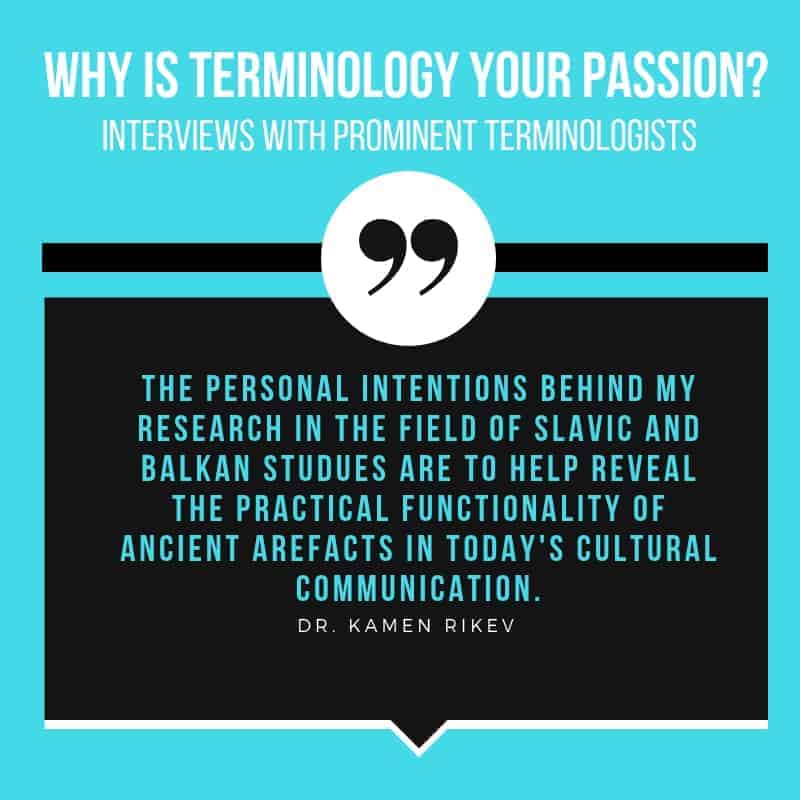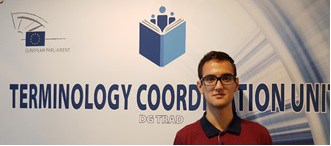
Dr. Kamen Rikev was born in Ruse, Bulgaria and graduated in The Sofia University “St. Kliment Ohridski”, where he also got his PhD. However, currently he is a lecturer at the Faculty of Humanities in the Marie Curie-Skłodowska University in Lublin, Poland. His fields of research are various, going from metaphysical context in Bulgarian literature, to old Polish poetry, and the Polish-Bulgarian intercultural dialogue. Apart from teaching, Mr. Rikev is also an author of several books, many articles, and has a fair amount of experience in the translation of works of literature.
Reference:
n.p. “The adressbook”. UMCS. 2018. Web. 27 July, 2018. https://www.umcs.pl/en/addres-book-employee,2318,en.html
1. First things first, when was your passion for language sparked and what encouraged you to develop professionally in the field of Bulgarian and Polish literature?
It started with my grandmother who talked to me exclusively in French. I reached the point of using French words in conversations with my parents and in playgroups. This was an extraordinary practice in Bulgaria of the 1980s that not only influenced my day-to-day communication, but also encouraged me to develop a deeper interest in translation and translatability. Primary school brought another challenge – the art of interpretation of literary works and historical information. I remember the teachers’ efforts to make children understand and interpret texts in a way that I did not tend to accept. After graduating from the English language school in my hometown, I was convinced that literature and translation offered a path to a better understanding of Europe’s cultural diversity, as well as the present and past of its many nations. Studying Slavic philology at the University of Sofia seemed like a natural choice in that direction, which lead to the challenge of academic research and teaching.
2. What is the best and most rewarding part of a professor’s work?
The constant contact with young people that are hungry for both practical and theoretical knowledge. I fully accept the concept of questioning the authority of the tutor, as it is a potent source for staying up-to-date with various aspects of today’s life.
3. IATE is the inter-institutional public database of the European Parliament. Are you aware of it, and if yes – what are your opinions on it?
I am familiar with IATE and regard it as an absolute necessity for both specialists and general users of administrative services. From a scholar’s perspective, IATE may serve as the ideal example of the non-exclusive nature of terminology – terms need context and interpretation, and will always be exposed to re-evaluations and re-definitions.
4. You have an experience in both translation and writing of scholarly papers on literature. What is the most interesting aspect of this work?
I prefer to regard both activities of translation and scholarly research as posing genuine creative challenges. It is my strong belief that the concept of objectivity cannot apply to the field of humanities in the way it is conceived in natural sciences. The process of translation and interpretation requires my professional and ethical respect to the text and its author, as well as to all potential recipients. When dealing with older texts, the biggest challenge is to preserve as much of their historical context as it is possible without harming their functionality. This is where I find the responsible and creative role of the translator/ researcher as the inevitable mediator in a world of extraordinary cultural and linguistic diversity.
5. What is the most challenging part during the translation of a certain work of literature? How do you deal with such difficulties?
I try to define the unique values of every literary work selected for translation. Then I have my struggles in transmitting part of that uniqueness to the audience. I think that this process always puts the translator in the role of a loser – he is condemned to sacrifice at least several aspects of the original text in order to activate other of its values. It doesn’t help that the concept “love”, for example, had different connotations in the 15th, 20th and the 21st centuries even if we restrict ourselves to a single linguo-cultural tradition. On the other hand, as a translator I feel the constant threat of implying more meanings than I am allowed to reveal by the original. Dealing with such practical problems is my biggest challenge as a translator. I believe that there are no perfect solutions to these difficulties, however, relying on your previous experience and professional intuition, and consulting respected colleagues is always helpful.
6. You have written several books and many articles concerning both Bulgarian and Polish language, literature, and metaphysical beliefs. Which area of study do you find most interesting and what makes it so intriguing?
Revealing contexts and aspects that for some reason have been omitted in previous research on literary works is a rewarding achievement. Trying to convince other researchers in the worthiness of your own methods and conclusions is a completely different task. I believe that Old Polish and Old Bulgarian cultures have exceptionally strong influences on today’s national traditions. To persuade contemporary audiences, especially university students, that in the cliché-truth, in order to understand the present we should know our past, is not a straightforward intellectual operation. The personal intentions behind my research in the field of Slavic and Balkan studies are to help reveal the practical functionality of ancient artefacts it today’s cultural communication.
7. You currently teach as a part of the Institute of Slavic Philology in the Marie Curie-Skłodowska University in Lublin, Poland. To what extent is terminology important to your work? In this sense, are you aware of the work that is being done in the Terminology Coordination Unit (TermCoord) of the European Parliament and do you have any thoughts about it?
As much as terminology is fundamental to any science and academic education, it is also a problematic field of its own, especially in the humanities. For instance, can we reach an agreement on the precise meanings of the terms „poem”, „epic”, „ballad”, „allegory” in the English, Bulgarian and Polish languages? I don’t think that the problems TermCoord is trying to address are of a different nature in spite of TermCoord’s strict scope of operation. Concerning IATE and TermCoord’s development and growing influence, I am convinced that in the coming years these platforms will become more influential to the point of providing models for creating and translating terminology outside the field of EU documentation.
8. Finally, is there a certain project/ book/ event connected to translation or terminology that you have taken part in or read about recently that you found very intriguing? Could you elaborate?
Although not strictly connected to terminology, I find the projects of the Ethnolinguistic School of Lublin extremely valuable. Prof. Jerzy Bartmiński and his team continue to research the linguistic worldview from various perspectives in journals such as “Etnolingwistyka” and separate monographs. A newly published book, which I would like to particularly recommend to wider audiences, is the fifth volume of the series “Axiological Lexicon of the Slavs and Their Neighbors” -dedicated to the concept of honour and edited by Petar Sotirov. The legacy of the Lublin School of Ethnolinguistics serves as a constant reminder that our common European identity is based on extremely dynamic concepts.
 Interview conducted by Boris Rusev – a senior student at The American College of Sofia in Sofia, Bulgaria and a study visitor at the European Parliament in Luxembourg.
Interview conducted by Boris Rusev – a senior student at The American College of Sofia in Sofia, Bulgaria and a study visitor at the European Parliament in Luxembourg.

